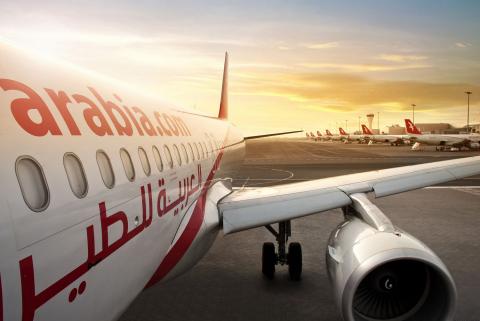
- First half revenues reach AED 1.816 billion, up 6 per cent compared to same period last year.
- 12 new routes added to global network and 3 new aircraft joined the fleet in first half of 2018.

Air Arabia (PJSC) today announced strong financial results for the first half ending June 30, 2018 as the Middle East and North Africa’s first and largest low-cost carrier continued to deliver solid and sustained financial performance.
Air Arabia reported a net profit of AED 230 million for the first half ending June 30, 2018; a 12 per cent less than the AED 261 million reported for the same period last year. The company’s turnover for the first six months of 2018 reached AED 1.816 billion, an increase of 6 per cent compared to AED 1.716 billion in the corresponding period last year. Air Arabia’s strong profits are registered despite the economic pressure that airlines have witnessed in the second quarter of this year, which was driven by lower yield margins, higher fuel prices and seasonality shift in traffic that the market has experienced.
Marking strong growth in passenger demand, Air Arabia flew 4.2 million passengers during the first half of 2018 and the airline’s average seat load factor for the first six month of 2018 - passengers carried as a percentage of available seats – stood at impressive 79 per cent.
Sheikh Abdullah Bin Mohamed Al Thani, Chairman of Air Arabia said: “Air Arabia’s strong financial results are a testament to the airline’s robust growth strategy, operational efficiency and unwavering commitment to delivering on its value-added proposition for customers.”
He continued: “The global aviation industry had to cope up with pressing economic challenges during the second quarter of this year and we are glad to see Air Arabia continuing to deliver strong financial and operational performance while maintaining its momentum growth across the breadth of its network.”
The company’s turnover in the second quarter ending June 30, 2018 reached AED 938 million, a 4 per cent increase compared to the same period of 2017. Net profit during the second quarter 2018 stood at AED 120 million, a 24 per cent less than the corresponding period of 2017. Air Arabia flew over 2.05 million passengers in the second quarter ending June 30, 2018 and the airline’s average seat load factor for the same period stood at a high 78 per cent.
He concluded: “Trading conditions continue to be influenced by the regional geopolitical and economic challenges, however, the outlook of low-cost travel in the region remains very strong. We continue to focus on further expanding our reach and operational efficiency capitalizing on the fundamental strength of our business model and the value driven product offering to our customers”.
During the first half of 2018, Air Arabia received three brand new Airbus A320 airplanes bringing its fleet size to 53 aircraft. The carrier added a total of 12 new routes to its global network in the first half of this year. Flights from Air Arabia’s main hub in Sharjah commenced to Moscow Sheremetyevo and Grozny in Russia; Bodrum and Izmir in Turkey; and Qabala in Azerbaijan. The carrier also expanded its operation from its Egypt hub with new flights connecting Alexandria to Milan; Alexandria to Sharm El Sheikh; Sohag to Jeddah and Kuwait; and Sharm El Sheikh to Beirut and Hurghada. The carrier also expanded domestic operation from its Morocco hub with a new flight connecting Nador with Casablanca. Air Arabia today operates flights to over 150 global destinations in 49 countries from four hubs in the UAE, Morocco, and Egypt.
In March, Air Arabia received the ‘Corporate Editor Choice Award’ at the 2018 Air Transport Awards organised by Air Transport News, in recognition of Air Arabia’s continued commitment to passenger satisfaction and development within the industry.
In June, the carrier declared that the financial exposure it has with the private equity firm “Abraaj” is limited to the Group’s investment portfolio and that there is no significant impact on Air Arabia’s business or on its liquidity status. As the court-supervised restructuring of Abraaj’s financially stressed funds is currently taking place, Air Arabia’s appointed team of experts continue to be actively engaged with the appointed JPL’s as well as all stakeholders and creditors involved in this matter to ensure that the rights of investors – including Air Arabia - are preserved.
Categories
- Log in to post comments